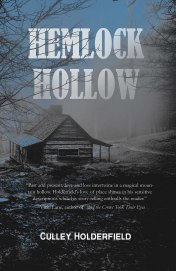Southern Literary Contributor Betsy Reeder interviewed Culley Holderfield, author of Hemlock Hollow.

Betsy Reeder
BR: What was the impetus behind this story? Did it nudge you over time or tackle you unexpectedly?
CH: The story came from out of characters and research. It started with a specific place, this hollow in Henderson County, NC, where my parents have a cabin. I knew I wanted to write about it and I did a lot of historical research about that specific area and its current and prior inhabitants. Carson Quinn and later Caroline McAlister were the fictional characters I created to help me, and I got to know them through spending time with them on the page. Once I knew them well enough, the story kind of told itself. With some of the plot twists, I was as surprised as the reader. Maybe more so!
BR: Your book jacket mentions your childhood experience in one of North Carolina’s mountain cabins. How did that influence your novel?

Culley Holderfield
CH: This novel came out of my experiences with a cabin very similar to the one Caroline inherits, in a hollow in Western North Carolina. My parents purchased it the year I was born, and I grew up spending my summers there, exploring like she does, and imagining the lives of the prior occupants. I could tell from the artifacts I would come across, such as abandoned thrashers and barbed wire fences and tractor pieces, that the landscape was probably different a hundred years before, and that change over time intrigued me enough to write a novel about it.
BR: Did you know what would happen to Carson and Marinda’s relationship from the start? Did they take any ownership of their story as you progressed?
CH: With Carson and Marinda I knew where their relationship had to go from the beginning, but I didn’t know how I was going to get there. The writing of this book took a long time. I wrote it in pieces. I wrote Carson’s journal all at once, immersed in the historical research I’d done. His voice just flowed onto the page, and I followed it wherever it led. Once I’d written it, I had this artifact, a journal, but it wasn’t a novel. Later, Caroline emerged, and her voice was more of a challenge. I worked hard at getting it right. I had ideas about how I wanted her plot to go, but Caroline being Caroline, she had her own ideas. Hers were better, so I learned to get out of the way and let her lead.
BR: What do you see as the greatest strengths and weaknesses of Caroline and Carson? What do you think was most important for them to learn?
CH: Both Caroline and Carson are earnest to a fault. They each could benefit from some of Aurelius Quinn’s humor. But, knowing their personal histories you might understand why they might not find much funny. They’re both scientists of a sort and smart, but they have judgmental streaks. Caroline has the benefit of hindsight, in seeing how Carson’s life played which helps her perhaps to see some of herself in him. That allows her maybe to accept herself in ways she wouldn’t have without the mirror of the journal.
 BR: Were there any parts of Hemlock Hollow that were particularly difficult to research or develop? Did you uncover anything in your research that surprised you?
BR: Were there any parts of Hemlock Hollow that were particularly difficult to research or develop? Did you uncover anything in your research that surprised you?
CH: I love doing historical research, which you probably can tell from reading this book. Interestingly, the novel came out of my inability to pin down the exact facts of this area. I had spent years researching the Hickory Nut Gorge and the 19th century, and didn’t’ find what I was looking for, so I decided I would create this fictional family, the Quinns, as a stand in for some real families in the area. Through fiction I was able to get closer to certain historical truths that I was seeking to convey. But there were plenty of interesting facts that surprised me. For instance, the story of the Kingdom of the Happy Land and the liniment cream they made is entirely true. As are the two earthquakes that are referenced. Lots of people really did believe the end times were coming when the quakes hit Rumbling Bald in 1874 and later 1886.
BR: Do you see yourself in some of the Hemlock Hollow characters? If so, which ones and in what ways?
CH: I don’t really do autobiographical fiction, though readers who know me and have read this book might beg to differ. Both Caroline and Carson share aspects of my biography and personality. But, only as jumping off points. Despite the admonition to do so, it’s actually hard to write what you know and have it show on the page. The problem with having a character that resembles you too closely is that you never see yourself from other people’s eyes. You’re blind to how you seem in the world. Good novelists tend to be great empaths, and our ability to get into the reader’s mind is aided by having characters distinct from ourselves.
BR: If a reader comes away with one unforgettable image or insight from reading Hemlock Hollow, what would you like that to be?
CH: It’s probably a lot to ask or expect, but I would hope it might inspire a reader to reflect on the places of their own that have haunted them in ways both delightful and frightening.
BR: Is there anything else you’d like to say about H.H.’s story or your experience creating it?
CH: Thank you for the opportunity to talk about Hemlock Hollow. I hope readers pick it up and enjoy the journey into the secret history of this magical hollow.
Leave a Reply